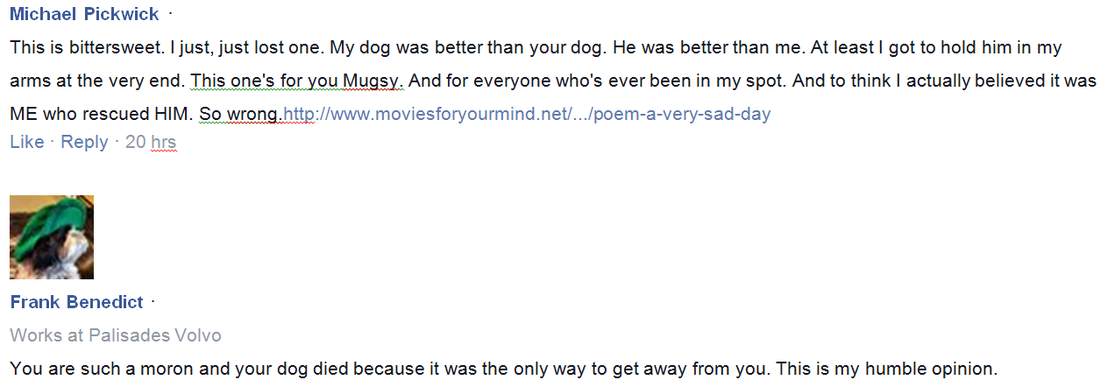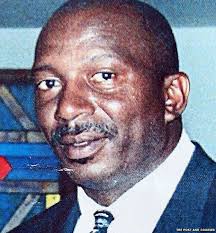
What kind of person makes fun of a dog’s death, and calls the grieving owner a “moron”? Why, a used car salesman, of course. Sounds like a bad joke? It’s not. It’s the response I got when I expressed how bittersweet it was for me, a dog lover, to watch Westminster Dog Show after losing a rescue dog that I loved dearly. I didn’t go into details on the short post—I really lost two beloved rescue dogs this year. But they were old, so I only pray they are at Rainbow Bridge. But here’s what:
FRANK BENEDICT, a cheesy car salesman at Palisades Volvo, in Nyack, New York, told me in no uncertain terms that “YOUR DOG DIED BECAUSE IT WAS THE ONLY WAY TO GET AWAY FROM YOU.” I know this because he posted his response on the internet, in response to my post:
800-458-1552. That’s where you can call Volvo and tell them what you think of Frank, who is the face of Volvo in Nyack, New York. Oh, and by the way, Frank is a rare kook in that, unless most vicious and filterless forum posters, who hurl their poison darts from behind a veil of anonymity, Frank is proud of his faux humble, pontificating assholiness. Frank clearly wants us to know who he is, and what he does. He not only tells us where he works, but with a couple of clicks, we find out he sells Volvos at Palisades Volvo, and his phone numbers at Palisades Volvo are: 845-358-2900, or 866-579-1687. Tell him what you think of people who mock the death of a dog. Oh please, go for it, friends.
And as if that isn’t weird enough, Frank and his wife—wait for it—actually attended the Westminster Dog Show. As in, they allegedly love dogs. But the next time you see a vicious, beyond-all-reason-cruel comment on the internet, (such as Frank the salesman’s) go ahead and Google the “qualities of a sociopath”, and see if they don’t fit. I can’t believe that someone with dogs all over his Facebook, and his wife’s Facebook page, would write such a thing. You should be ashamed, Frank. Your dogs deserve better. Talk about dogs that need to be rescued. . .
(FYI. Michael Pickwick is my best friend in the world, besides my dog. I was posting for some projects of his last night, and when I saw the Westminster results—love that show—I posted my brief eulogy comments under Mike’s name. But transparency is a two way street, so here goes: I am Meg Langford, a proud veteran of George Mason University and an American Forensics Association Hall of Fame Inductee. I rescue dogs. And I don’t sell used cars. I make art, specializing in miniatures, and I write about social causes. I don’t own a car, and now I will never buy a Volvo. Read the poem to my dog, “Today, A Very Sad Day” at moviesforyourmind.net. God Bless, and Peace Out. And by the way, Frank Benedict, you pathetic turd of a human being … you made me cry.)


 RSS Feed
RSS Feed